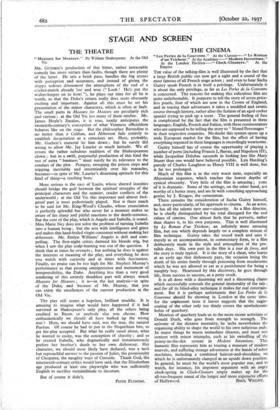THE CINEMA
"Les Perles de la Couronne." At the Curzon—" Le Roman d'un Tricheur." At the Academy—" Modern Inventions." At the London Pavilion—" Glock-Cleaners." At the Empire THE value of the talking-film is well illustrated by the fact that a large British public can now get a sight and a sound of the
most famous of all French stage actors ; and even to hear Sacha Guitry speak French is in itself a privilege. Unfortunately it is about the only privilege, as far as Les Perles de la Couronne is concerned. The reasons for making this ridiculous film are quite unfathomable. It purports to tell the story of seven price- less pearls, four of which are now in the Crown of England, and in tracing their adventures it takes a muddled and erratic course through history, rather after the fashion of an aged cocker spaniel trying to pick up a scent. The 'general feeling of fuss is complicated by the fact that the film is presented in three languages, English, French and Italian, with three commentators who are supposed to be telling the story to " Noted Personages " in their respective countries. No doubt this system opens up a wide European market for the film, but the effect of having everything repeated in three languages is exceedingly wearisome. Guitry himself has of course the opportunity of playing a number of parts (including Francis I, Barras, and Napoleon III), while Jacqueline Delubac succeeds in looking less like Mary Stuart than one would have believed possible. Lyn Harding's parody of Charles Laughton as Henry VIII is well done, but is far too prolonged.
Much of this film is in the very worst taste, especially an Abyssinian sequence, which reaches the lowest depths of cynical obscenity. Very little of the film is amusing ; cone of it is dramatic. Some of the settings, on the other hand, are worthy of a better story, and are lit with something approaching genius by J. Kruger, the cameraman.
There remains the consideration of Sacha Guitry himself, and, more particularly, of his approach to cinema. As an actor, he has all the talents save one—sincerity. As a film director, he is chiefly distinguished by his total disregard for the real values of cinema. One almost feels that he perverts, rather than shapes it, to his own purposes. This is well illustrated by Le Roman d'un Tricheur, an infinitely more amusing film, but one which depends largely on a complete misuse of film technique. Guitry takes the sound track and uses it merely as an accompaniment, in commentary form, to a film deliberately made in the style and atmosphere of the pre- talkie days. His own part in the film is a tour de force, and the story is truly typical. It is the story of a cheat, who learns at an early age that dishonesty pays, the occasion being the death of his entire family through poisoning from mushrooms which he was not allowed to eat as a punishment for being a naughty boy. Heartened by this discovery, he goes through life, from success to success, as a petty crook.
It is all done with a disarming wit and a discerning charm which successfully conceals the general immorality of the tale ; and for all its blind-alley technique it makes for real entertain- ment. But it is perhaps unfortunate that Les Perles de la Couronne should be showing in London at the same time, for the unpleasant taste it leaves suggests that the sugar- coating of the other only too thinly covers the unwholesome bolus of quackery.
Mention of quackery leads us to the more recent activities of Donald Duck, who goes from strength to strength. The epitome of the dictator mentality, he lacks nevertheless the organising ability to shape the world to his own nefarious ends. In major things he meets immediate disaster, and must rest
content with minor triumphs, such as his swindling of the
penny-in-the-slot system in Modern Inventions. This fantastic film represents him as touring a museum of modern marvels, and suffering strange adventures at the hands of robot machines, including a combined haircut-and-shoeshine, on which he is unfortunately clamped in an upside down position. In general, he must be the world's most popular star, and to watch, for instance, his impotent argument with an angrY clock-spring in Clock-Cleaners amply makes up for the all-too-frequent ennui of the longer and more expensive efforts






























































 Previous page
Previous page